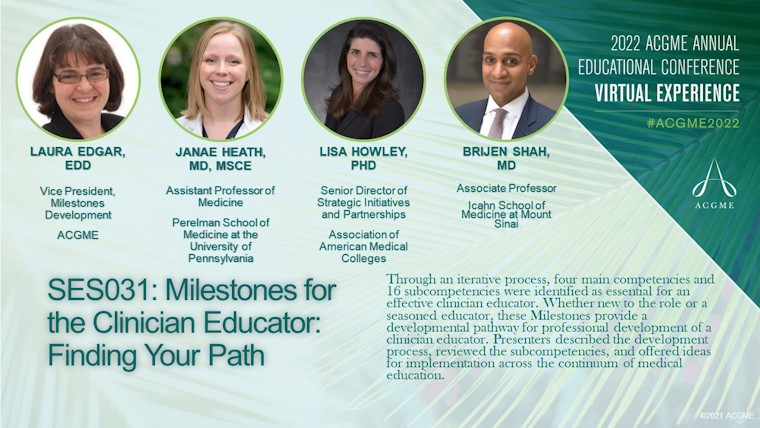#ACGME2022 Session Summary: Milestones for the Clinician Educator—Finding Your Path
The new Clinician Educator Milestones are designed to aid in the development and improvement of teaching competence by assessing educational skills of faculty members across the continuum of medical education. They were introduced and contextualized in a session at the 2022 ACGME Annual Educational Conference, Milestones for the Clinician Educator: Finding Your Path. An important joint initiative of the ACGME, Accreditation Council for Continuing Medical Education (ACCME), Association of American Medical Colleges (AAMC), and American Association of Colleges of Osteopathic Medicine (AACOM), a pilot version of these Clinician Educator Milestones is currently posted for public comment, with comment a deadline of April 30, 2022.
Presenters Laura Edgar, EdD, CAE (ACGME); Janae Heath, MD (University of Pennsylvania); Lisa Howley, PhD, (AAMC); and Brijen Shah, MD, (Mount Sinai and Icahn School of Medicine) addressed the important nuances of this new Milestones set, which has important distinctions from the ACGME’s standard Milestones for specialty and subspecialty program evaluation of residents and fellows.
Importantly, the Clinician Educator Milestones are not an ACGME accreditation requirement and are not intended to become one in the future. Rather, they provide a framework for assessment of educational skills of faculty members to improve and enhance their effectiveness in certain areas of their role as educator.
Presenters began with three questions of the audience:
- Did you “plan” to become a clinician educator?
- When was the last time you did a self-assessment of your educator skills?
- How much time have you spent learning or improving your educator skills?
The questions were designed to help educators reflect on how they came to choose a career in academic medicine and where they are in their journey as educators. Experienced faculty members may assume they are at a high level of competence as educators, but the Clinician Educator Milestones provide the opportunity for self-assessment in 18 subcompetencies, allowing all faculty members to assess themselves on a range of educational skills. Faculty members can start by using the Clinician Educator Milestones as a self-assessment. They may also choose to involve a trusted peer to provide an objective assessment of their skills in a particular area.
“This is one of the first times that we have common language that goes across the UME [undergraduate medical education], the GME [graduate medical education], and CPD [continuing professional development] world, which makes this a really exciting new program,” stated Dr. Edgar.
She went on to note that the Clinician Educator Milestones are designed to help with professional development, and not to be any sort of requirement. They are not intended to be high stakes, but were developed to be used by individuals to improve in specific subcompetency areas. Though self-reflection is not easy, these Clinician Educator Milestones are an opportunity for individuals to assess their skills as educators in a variety of specific areas.
Four Competency Milestones
Presenters listed four competencies: educational theory and practice; diversity, equity, and inclusion; well-being; and administration. Within the competencies are 18 subcompetencies.
The educational theory and practice milestone is at the heart of what clinician educators do every day. The intent of this milestone is to ensure the optimal development of competent learners through the application of the science of teaching and learning to practice.
The overall intent of the diversity, equity, and inclusion milestone is to acknowledge and address the complex intrapersonal, interpersonal, and systemic influences of diversity, power, and inequity (power, privilege) to promote equity and inclusion in all settings so all educators and learners can thrive and succeed.
The well-being milestone is intended to apply principles of well-being to develop and model a learning environment that supports behaviors that promote personal and learner psychological, emotional, and physical health. It was noted that the epidemic of physician burnout has been made worse by the COVID-19 pandemic, and that the National Academy of Medicine Collaborative on Clinician Well-Being and Resilience includes resources in this area, many of which are referenced in the companion Supplemental Guide to the Clinician Educator Milestones.
The administration milestone covers leadership. The concept of administration is broad and diverse in its appearance. Educators do not need to be in a senior position or hold a formal administrative title to benefit from this domain and its subcompetencies.
Subcompetencies for each Clinician Educator milestone can also be divided into three areas based on faculty member roles, and making the Milestones valuable for educators, educational scholars, and educational leaders (administrators and program directors). To ensure the optimal development of competent learners through the application of the science of teaching and learning to practice, the Milestones are divided into nine subcompetencies: feedback; learner assessment; professionalism; remediation; learner professional development; program evaluation; science of learning; scholarship; and teaching.
Each subcompetency is structured to provide a road map for educators to think through their ongoing professional development. The Supplemental Guide offers examples at every subcompetency level, and at every level across the medical education continuum.
Currently in Pilot Phase
The Clinician Educator Milestones are currently in an active pilot testing phase. The pilot will be open for comment through April 30, 2022, and the Milestones are scheduled to be available for use in May 2022.
For more information about the Clinician Educator Milestones, visit the Milestones page of this website. To review these Clinician Educator Milestones and provide comments, visit the Milestones Engagement page. Email Milestones@acgme.org with any questions.

